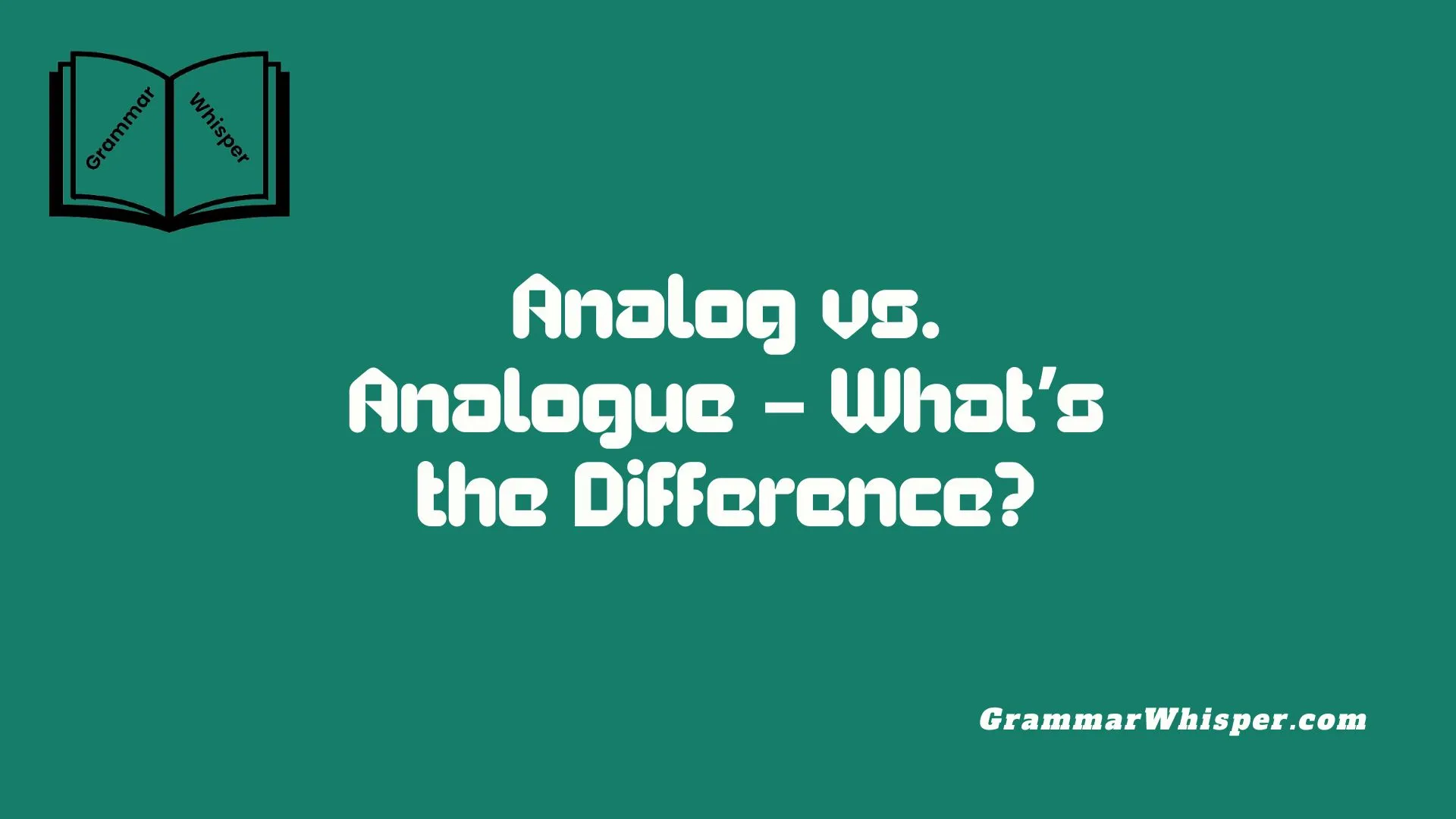The language we use always evolves, but spelling tends to sit on a quiet battlefield of global variation. Working with clients across borders, I’ve seen the debate between Analog vs. Analogue spark confusion. Though the differences appear subtle, their cultural significance is powerful. In American English, “analog” is the go-to in technical fields, while British English naturally favors “analogue.” Both terms are nearly identical, and their meanings constantly overlap, yet each choice reflects regional preference and personal identity.
If you scratch the surface, you uncover rich layers of history that show how words get adopted and standardized. It’s not just a matter of spelling – it’s part of a national voice. A reliable guide will dive deep into this difference, so you really know what fits where. From the writer’s perspective, grasping these distinctions helps create an authentic tone that connects with the locale and aligns with the reader’s linguistic expectations.
Understanding the Core Meaning of Analog and Analogue
Both “analog” and “analogue” stem from the Greek word analogos, meaning “proportionate” or “according to a ratio.” In modern usage, they are often employed to describe systems or devices that process information in a continuous stream rather than discrete steps – in contrast to digital systems.
Despite their spelling difference, the two terms share the same core definition:
Analog/Analogue (adj): relating to or using signals or information represented by a continuously variable physical quantity such as spatial position or voltage.
But they also have figurative meanings, such as when something is an “analogue” to something else – a counterpart or parallel.
A Brief History of the Spelling Split
The split in spelling has its roots in the broader divergence between American English and British English that began in the 18th century.
Why Did American English Change?
- Noah Webster, a key figure in standardizing American spelling, pushed for simplification.
- Words like “colour” became “color,” and “analogue” followed the same logic.
- American spelling tends to remove silent letters or simplify endings: hence “analog.”
How Did British English Retain “Analogue”?
- The UK maintained more traditional French- and Latin-derived spelling rules.
- “Analogue” stayed consistent with other British spellings like “dialogue,” “catalogue,” etc.
“Spelling is not just about correctness. It reflects identity, tradition, and influence.” – Linguist David Crystal
The Digital Revolution and the Rise of “Analog”
In the 20th century, the world witnessed a technological boom. One of the most visible battlegrounds for spelling was in electronics and computing.
Why “Analog” Dominated in the US Tech Scene
- American companies like Texas Instruments, RCA, and Bell Labs standardized the term.
- U.S. textbooks, manuals, and patents consistently used “analog.”
It became the default term for devices transmitting data via continuous signals:
| Device Type | Analog Usage (US) |
| Television | Analog TV signal |
| Audio | Analog audio jack |
| Recording | Analog cassette tape |
| Transmission | Analog radio |
As these technologies spread, so did the simplified spelling.
Why the UK Still Uses “Analogue”
Despite globalization, the UK has held firm to “analogue.”
Where You’ll Still See “Analogue”
- UK Broadcasting: Analogue terrestrial TV was standard before digital switchover.
- British Curriculum: Academic textbooks and science syllabi often prefer “analogue.”
- Media Outlets: Trusted publications like the BBC and The Guardian favor “analogue.”
Examples from Real Contexts
- “The UK government has announced the final switch-off date for analogue radio.”
- “Students must understand the difference between analogue and digital inputs.”
While “analog” dominates in the US, “analogue” persists in the UK, Ireland, Australia, New Zealand, and Commonwealth nations.
Side-by-Side: Regional Usage in Real-World Contexts
Let’s break down the usage patterns of both terms in various domains:
| Context | Analog (US) | Analogue (UK/Commonwealth) |
| Academic Research | Dominates US papers | Dominates UK papers |
| Product Labels | Electronics in US | Electronics in UK |
| News Media | CNN, NYT | BBC, The Guardian |
| Google Search Traffic | 5.6M+/mo (US) | 1.4M+/mo (UK) |
| Digital Marketing Materials | SaaS, Tech startups | Government, academia |
| Educational Curricula | US-based platforms | Cambridge, Oxford Boards |
“When in doubt, align your spelling with your audience’s region. Consistency builds trust.”
Spelling Consistency: Globalization vs. Localization
In today’s connected world, businesses and creators must balance global reach with local sensitivity.
Common Scenarios
- SaaS and Tech Blogs: US companies opt for “analog” in product documentation.
- International Brands: May alternate spelling depending on domain or audience location.
- Marketing Teams: Often perform A/B testing to see which spelling converts better.
Tips for Writers & Marketers
- Use language-specific subdomains (e.g., uk.example.com vs us.example.com)
- Maintain spelling consistency within each version.
- Leverage Hreflang tags in web development for better localization.
Technical Usage Differences: More Than Just Spelling?
While the spelling varies, so do some contextual meanings based on field or discipline.
Analog in Engineering & Physics
- Refers strictly to non-digital signals.
- Examples:
- Analog circuits
- Analog-to-digital converters (ADC)
- Analog modulation (AM radio)
Analogue in Humanities & General Discourse
- Refers to something comparable or equivalent.
- Examples:
- “The modern analogue of medieval feudalism.”
- “An analogue for emotional intelligence.”
Key takeaway: In STEM fields, “analog” is more common even outside the US. In literature or metaphorical contexts, “analogue” remains strong globally.
Language Nuance: Analog/Analogue as Metaphor
The figurative use of the term is rich in literature and social commentary. For instance:
- “She is the analogue of her grandmother: fierce, wise, and quiet.”
- “Think of vinyl records as the analog of raw storytelling.”
These uses go beyond tech, speaking to human experience, philosophy, and narrative symbolism.
British writers tend to lean toward “analogue” for such literary flourishes.
SEO and Digital Content Strategy: Which to Use and When
If you’re creating content online, choosing the right variant isn’t just about spelling. It affects:
- Search engine visibility
- Content clarity
- Localization performance
Google Trends Snapshot (Last 12 Months)
| Term | Global Interest | US Rank | UK Rank |
| Analog | 78% | #1 | #2 |
| Analogue | 22% | #3 | #1 |
Best Practices
- Target US audiences? Use “analog.”
- Target UK/Commonwealth readers? Use “analogue.”
- Create region-specific landing pages using both variants.
Mnemonic Tips and Tricks to Tell Them Apart
Having trouble remembering which to use? Try these:
- Analog = America. It’s shorter, like other American spellings.
Analogue = UK. It keeps the extra letters like “catalogue” or “dialogue.”
Visual Reminder Table
| Mnemonic | Use In | Example Phrase |
| Analog = America | USA | “Analog signal detected” |
| Analogue = Dialogue | UK | “British analogue input” |
Final Thoughts
The difference between analog and analogue may seem minor at first glance, but it reflects broader nuances in language, culture, and technology. Whether you’re drafting a technical document, writing for an international audience, or simply trying to maintain consistency in your spelling, knowing when to use “analog” vs. “analogue” can elevate your clarity and professionalism.
Remember this simple rule of thumb: use “analog” in American English and “analogue” in British English, unless the context clearly calls for a specific form (such as technical usage). This small distinction can carry significant weight in global communication, especially in industries where precision and standardization matter.
FAQs
Is “analog” wrong in British English?
No, it’s not “wrong,” but it would be considered an Americanism. UK style guides prefer “analogue.”
Can I use “analogue” in American tech writing?
Technically yes, but it will appear nonstandard to American readers and editors.
Should I use both versions in the same document?
Avoid mixing them. Choose one spelling based on your audience and stick with it throughout the piece.
Why does spellcheck flag “analogue” on my US computer?
Because your system is set to American English. Switch to British English if you’re writing for UK readers.
Which spelling is better for SEO?
It depends on your market. “Analog” performs better in the US; “analogue” is stronger in the UK.











